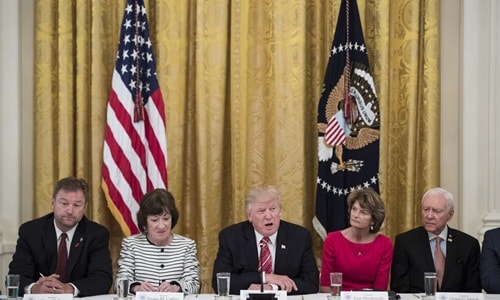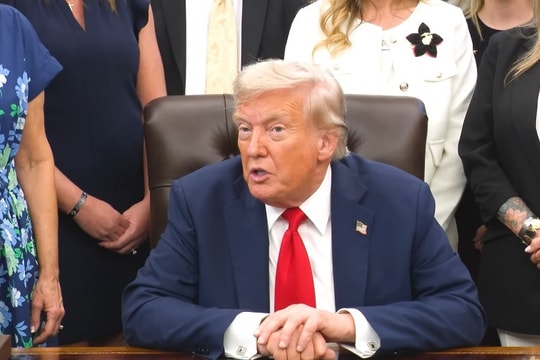Obstacles surround Trump because he lost the trust of Republicans
The US President still has difficulty gaining support, even from Republicans, when passing important decisions.
 |
US President Donald Trump meets with Republicans to discuss the health care bill. Photo: Washington Post |
In an attempt to drum up support for the Republican health care bill, President Donald Trump called Utah Republican Senator Mike Lee on June 26 to convince him to vote for it. However, a personal call from the US President was not enough. On June 27, Lee said he would vote against it, according to the Washington Post.
Republican senators on June 22 unveiled a revised health care bill from the version passed by the US House of Representatives, aiming to replace the Affordable Care Act (Obamacare) from the era of former President Barack Obama. The new bill is awaiting approval in the Senate, but experts say the process is extremely difficult.
Senate Republican leaders have postponed a vote on the bill because too many Republicans oppose it, at least for now.
Trump was optimistic that the health care bill would pass easily. But things didn't go as planned, the bill stalled and he had to go back to the negotiating table. According to Washington Post writers Philip Rucker, Robert Costa and Ashley Parker, this is the latest evidence of the US President's limits in winning support on Capitol Hill.
Lost trust
History has shown that successful US presidents are both feared and respected. But the discord within the Republican Party in Washington is showing the opposite, observers say.
Despite being the party leader, US President Donald Trump has struggled to convince Republican lawmakers to side with him when it comes to major decisions. As a result, no truly groundbreaking policy decisions have been made in his first five months in office. The confirmation of Supreme Court Justice Neil M. Gorsuch has been his most significant achievement to date.
Trump "is the first president in history who has neither political nor military experience. So learning how to communicate with Congress and push his agenda forward is going to be a real challenge for him," said Maine Republican Senator Susan Collins, who also opposes the Republican health care bill.
"The president is still on his own, not part of the traditional Republican Party," commented Florida Congressman Carlos Curbelo. "I gave Mr. Trump the same power I gave Mr. Obama. When I agreed, I worked with them. When I disagreed, I refused," he emphasized.
In private conversations on Capitol Hill, Mr. Trump is often dismissed as a snub, according to the Washington Post. Some Republicans view his promises, such as making Mexico pay for a border wall, as unrealistic.
They are sometimes exhausted and angry at the way he jumps from topic to topic or at his inflammatory Twitter posts. They quickly recognize his lack of experience in governing and policymaking. Many see Trump's threats as meaningless and feel there is no danger in opposing him.
"The House vote on the health bill shows that he has some support, especially from those on the right," said South Carolina Republican Senator Lindsey O. Graham. "The Senate vote shows that health care is a vital issue and it's very difficult for a politician to get a senator to cast a vote that could affect them for the rest of their lives."
When asked if he was afraid of President Trump, Graham laughed and said, "No."
California Republican Congressman Darrell Issa, who disagrees with Trump on a range of issues, said few members of Congress fear retaliation from the US president.
“He comes from the private sector, where your business partner today is not always your partner tomorrow,” Issa said. “What you agree with today doesn’t mean you have to agree with forever.”
A senior Republican close to the White House and many senators commented that President Trump is nothing more than a "paper tiger". This makes Republican congressmen feel free and comfortable "doing things their way".
John Weaver, a Republican adviser who frequently criticizes Mr. Trump, has been outspoken about why the US President cannot run the apparatus smoothly.
"When you have a 35% approval rating and you have an FBI investigation, your voice doesn't carry much weight," Weaver said, referring to the investigation into ties between Mr. Trump's campaign and Russia.
According to Chris Whipple, author of the book "The Gatekeepers" about the work of White House chiefs of staff, the turmoil inside the presidential office as well as Trump's inability to articulate a clear message or vision of his agenda makes it difficult for him to impose a framework in Congress.
“Nothing is more feared on Capitol Hill than success, and all the White House has done is fail after fail,” Whipple said. “They have no track record. Who would be afraid?”
According to VNE
| RELATED NEWS |
|---|








